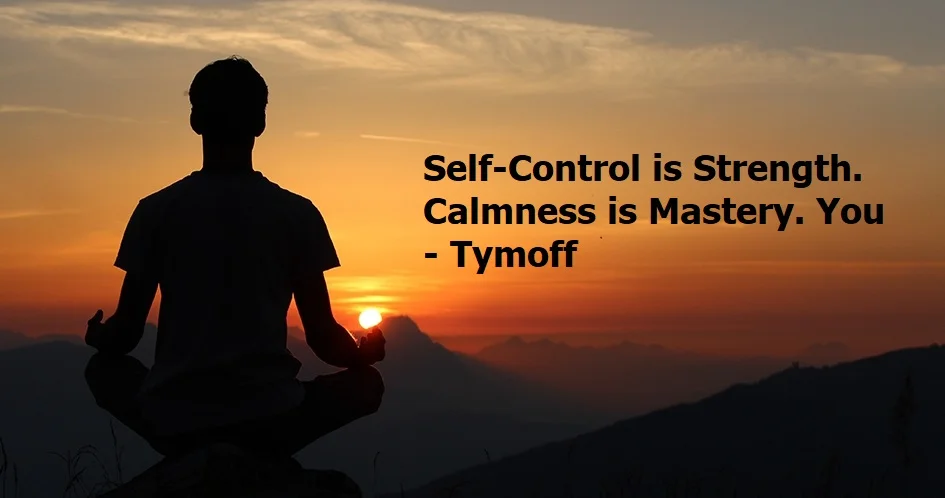In a world filled with distractions, temptations, and constant pressures, the ability to exercise self-control and maintain calmness is a rare and invaluable skill. These two qualities—self-control and calmness—are not just virtues but fundamental pillars of personal strength and mastery over one’s life. The phrase Self-Control Is Strength. Calmness Is Mastery. You – Tymoff encapsulates a profound truth: true power lies not in external dominance but in internal discipline and emotional equilibrium.
Self-control is the foundation of resilience, discipline, and long-term success. It is the ability to resist short-term gratification in favor of long-term goals, to manage impulses, and to stay focused despite challenges. Without self-control, even the most talented individuals can fall prey to procrastination, unhealthy habits, and self-sabotage. On the other hand, calmness represents emotional intelligence at its peak—the ability to remain composed under pressure, think clearly in chaos, and respond rather than react to life’s adversities. Together, these traits form the essence of mental and emotional mastery, allowing individuals to navigate life’s complexities with wisdom and grace.
The Power of Self-Control: The True Measure of Strength
Self-control is often misunderstood as mere willpower or suppression of desires. However, it is much deeper—it is the conscious regulation of thoughts, emotions, and behaviors in alignment with one’s values and objectives. Studies in psychology, particularly the famous “Marshmallow Test” conducted by Walter Mischel, demonstrate that children who exhibited higher self-control by delaying gratification tended to have better life outcomes in terms of academic success, career achievements, and even emotional well-being.
Why Self-Control Equals Strength
- Resisting Temptation – In a world of instant gratification, the ability to say “no” to distractions (social media, junk food, impulsive spending) is a superpower. Every time you exercise restraint, you strengthen your mental discipline.
- Building Discipline – Success in any field—whether fitness, business, or personal growth—requires consistent effort. Self-control ensures you stick to your routines even when motivation fades.
- Emotional Regulation – Reacting impulsively to anger, frustration, or stress often leads to regret. Self-control allows you to pause, reflect, and choose a wiser response.
- Long-Term Thinking – Many people sacrifice future happiness for momentary pleasure. Self-control aligns your actions with long-term success, whether in finances, health, or relationships.
How to Develop Self-Control
- Start Small – Practice delaying small gratifications (e.g., waiting 10 minutes before checking your phone).
- Remove Temptations – If social media distracts you, use apps to block it during work hours.
- Mindfulness & Meditation – These practices enhance self-awareness, making it easier to recognize and control impulses.
- Accountability – Share your goals with someone who can hold you accountable.
Calmness as Mastery: The Art of Emotional Control
While self-control governs actions, calmness governs emotions. A calm mind is a powerful mind—one that can assess situations objectively, make rational decisions, and maintain inner peace despite external chaos. Calmness is not the absence of emotion but the mastery over it.
Why Calmness Equals Mastery
- Better Decision-Making – Under stress, the brain’s amygdala (the emotional center) can override rational thinking. Calmness keeps the prefrontal cortex (the logical center) in control, leading to wiser choices.
- Enhanced Focus – A calm mind is undistracted, allowing deeper concentration and productivity.
- Stronger Relationships – Reacting with anger or frustration damages relationships. Calmness fosters patience, empathy, and effective communication.
- Health Benefits – Chronic stress leads to health issues like hypertension and weakened immunity. Calmness reduces cortisol levels, promoting longevity.
How to Cultivate Calmness
- Deep Breathing – When stressed, take slow, deep breaths to activate the parasympathetic nervous system (the “rest and digest” response).
- Practice Stoicism – The Stoic philosophy teaches accepting what you cannot control and focusing only on your responses.
- Limit Stimulants – Excessive caffeine or sugar can heighten anxiety. Opt for calming teas like chamomile.
- Nature & Silence – Spend time in nature or meditate daily to quiet the mind.
The Synergy Between Self-Control and Calmness
These two traits are interconnected—self-control helps maintain calmness, and calmness reinforces self-control. For example:
- If you control impulsive reactions (self-control), you remain calm in arguments.
- If you stay calm under pressure (calmness), you make disciplined decisions rather than panicking.
Real-Life Applications
- Leadership – Great leaders remain composed in crises and make calculated moves.
- Financial Success – Avoiding impulsive spending (self-control) and staying calm during market crashes leads to wealth preservation.
- Personal Growth – Mastering emotions and actions leads to confidence, resilience, and fulfillment.
Conclusion: You Hold the Power
Ultimately, the quote “Self-Control Is Strength. Calmness Is Mastery. You – Tymoff“ reminds us that true power comes from within. External achievements mean little without internal discipline and peace. By cultivating self-control, you build strength. By mastering calmness, you gain control over life’s unpredictability. And most importantly—you are the one who decides whether to let impulses rule you or to rise above them with wisdom and composure.
The journey to self-mastery begins with a single step: the choice to act with intention, not impulse, and to respond with clarity, not chaos. Are you ready to embrace your strength and mastery? The power lies within you.
Read more: LoveLolaBlog Codes: Unlocking the Secrets to a Stylish and Organized Life
